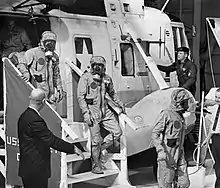William Carpentier | |
|---|---|
| Born | 1935 or 1936 (age 87–88) |
| Citizenship | United States |
| Alma mater | University of British Columbia |
| Occupation | physician / flight surgeon |
| Known for | flight surgeon for Apollo 11 and Apollo 13 |
| Awards | |
William Carpentier (born 1935/36, Edmonton, Alberta)[1][2] is a Canadian-American physician best known as the flight surgeon assigned to the United States' Apollo 11 mission, the first manned spacecraft to land on the Moon. Carpentier says that this was the highlight of his career. In the months following the Apollo 11 mission, Carpentier became known as a world famous physician. He later went into nuclear medicine research.
Carpentier is a recipient of the Presidential Medal of Freedom, with which he was decorated for his role in the Apollo 13 mission.
Early life and education
William Carpentier was born in Edmonton, Alberta[2] and raised in Lake Cowichan, British Columbia.[3] His mother was Canadian and his father was a Rhode Islander who had to forfeit his United States citizenship during World War II due to his enlistment in the Canadian Army.[4] Carpentier attended Lake Cowichan Secondary School and went on to study at Victoria College.[3] In 1961 he graduated from the University of British Columbia School of Medicine.[3]
According to Carpentier, the achievements of Alan Shepard and Yuri Gagarin piqued his interest in space exploration and, after medical school, he moved to Ohio to pursue additional studies in aviation medicine at Ohio State University.[3]
Career
Carpentier was selected as a flight surgeon trainee by the U.S. National Aeronautics and Space Administration (NASA) in January 1965 and made a staff flight surgeon the following July.[5][6] According to Carpentier, he attempted to apply for appointment to the Astronaut Corps, however, found that as a Canadian he was ineligible to do so.[4] Though he considered renouncing his citizenship, he chose not to after learning the process for naturalization as an American would take several years.[4]

He ultimately served as a medical staff member assigned to several Gemini missions and Apollo missions, including as flight surgeon for Apollo 11 and Apollo 13.[5] During the recovery of Apollo 11 astronauts Neil Armstrong, Michael Collins, and Buzz Aldrin from the Pacific Ocean, Carpentier was assigned to Helicopter 66, the primary rescue helicopter which ferried the men to the waiting USS Hornet. Both Carpentier and NASA engineer John Hirasaki – who had come into contact with Moon dust – were confined with the astronauts for their 21-day quarantine.[7] In the period following their release from isolation, the publicity demands on Armstrong, Collins, and Aldrin became so great that Carpentier was sometimes pressed into service to make public appearances in their place after a United States Department of State publicist concluded that the physician "was famous enough".[4] During travel on Air Force One he would be registered by crew into the flight manifest under the initials "WFP" for "world famous physician", a moniker that would stay with him for life.[4]
In 1973, after completing a fellowship in nuclear medicine at Baylor University,[4] Carpentier entered the private sector as a researcher at Texas' Scott & White Healthcare, spending thirty years there before retiring in 2003.[5] Following retirement, Carpentier returned to NASA as a consultant studying the cardiovascular systems of astronauts.[3]
In 2012, Carpentier returned to the former U.S. Navy aircraft carrier USS Hornet – where he had been quarantined with Armstrong, Collins, and Aldrin 43 years before – to participate in a memorial service for the recently deceased Armstrong.[8][lower-alpha 1]
Personal life
Carpentier is married.[3][4] As of 2013 he was living in Belton, Texas.[3]
Legacy
Carpentier was decorated with the Presidential Medal of Freedom for his work on Apollo 13 and, in 2013, received the University of British Columbia Alumni Award of Distinction.[5][9] A fountain at Lake Cowichan's Central Park is dedicated to Carpentier.[10]
Notes
- ↑ USS Hornet, in 2012, was a museum ship docked in Alameda, California, operating as the USS Hornet Museum.[8]
References
- ↑ "Vancouver Island man hero as Apollo doctor". Port Angeles Evening News. Port Angeles, Washington. July 27, 1969. p. 10. Retrieved October 30, 2017 – via Newspapers.com.

- 1 2 "Isolation Ended". Ottawa Journal. August 11, 1969. p. 4. Retrieved August 30, 2018.
- 1 2 3 4 5 6 7 Chung, Lindsay (November 20, 2013). "Lake Cowichan grad who became the 'world famous physician' honoured". Lake Cowichan Gazette. Retrieved September 27, 2017.
- 1 2 3 4 5 6 7 "Canada's Aerospace Medicine Pioneers". space.gc.ca. Canadian Space Agency. Archived from the original on February 5, 2008. Retrieved September 28, 2017.
{{cite web}}: CS1 maint: bot: original URL status unknown (link) - 1 2 3 4 "William Carpentier, MD'61". Alumni UBC 100. University of British Columbia. Archived from the original on July 11, 2019. Retrieved September 27, 2017.
- ↑ Carpentier, William (2015). "A Recollection of Gemini from 40 feet and 20 knots" (PDF). NASA News & Notes. 32 (4). Retrieved September 27, 2017.
- ↑ Edwards, Owen (July 2004). "Splendid Isolation". Smithsonian Magazine. Retrieved September 27, 2017.
- 1 2 Hegarty, Peter (November 1, 2012). "Tribute in Alameda to Neil Armstrong planned for USS Hornet". San Jose Mercury News. Retrieved September 28, 2017.
- ↑ "Alumni Achievement Awards Past Recipients". University of British Columbia.
- ↑ "Parks and Recreation". lakecowichan.bc.ca. Town of Lake Cowichan. Retrieved September 28, 2017.
External links
- film of Carpentier entering quarantine with Apollo 11 astronauts in 1969
- Campbell, Mark R. (September 1, 2017). "Dr. William Carpentier—Apollo 11 Flight Surgeon". Aerospace Medicine and Human Performance. 88 (9): 892–893. doi:10.3357/AMHP.4880.2017. PMID 28818152.